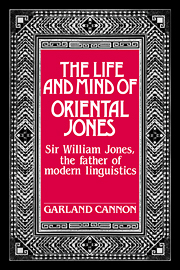Book contents
- Frontmatter
- Contents
- Preface
- Introduction
- Chronology of Jones's Life
- 1 A Barbaric Oriental Conqueror (to 1770)
- 2 Delicate Arab Maidens and Liquid Ruby (1770–1772)
- 3 Persian Jones and Constitutional Law (1772–1777)
- 4 The Athenian and Eleutherion (1778–1780)
- 5 An Ass Laden with Gold (1780)
- 6 Politics: Writings and Activism (1780–1782)
- 7 James River Property (1782–1783)
- 8 A Vision in the Indian Ocean (1783–1785)
- 9 A Sacred Oriental Language (1785)
- 10 A Genetic Explanation: Indo-European (1786–1787)
- 11 Sanskrit Literary Treasures (1787–1788)
- 12 An Indian Renaissance (1789)
- 13 A Burning Tropical Sun (1790–1791)
- 14 Scholar-Martyr (1791–1794)
- 15 Jones Today
- Appendix Five New Letters by Jones
- Notes
- Selected Bibliography
- Index
14 - Scholar-Martyr (1791–1794)
Published online by Cambridge University Press: 11 September 2009
- Frontmatter
- Contents
- Preface
- Introduction
- Chronology of Jones's Life
- 1 A Barbaric Oriental Conqueror (to 1770)
- 2 Delicate Arab Maidens and Liquid Ruby (1770–1772)
- 3 Persian Jones and Constitutional Law (1772–1777)
- 4 The Athenian and Eleutherion (1778–1780)
- 5 An Ass Laden with Gold (1780)
- 6 Politics: Writings and Activism (1780–1782)
- 7 James River Property (1782–1783)
- 8 A Vision in the Indian Ocean (1783–1785)
- 9 A Sacred Oriental Language (1785)
- 10 A Genetic Explanation: Indo-European (1786–1787)
- 11 Sanskrit Literary Treasures (1787–1788)
- 12 An Indian Renaissance (1789)
- 13 A Burning Tropical Sun (1790–1791)
- 14 Scholar-Martyr (1791–1794)
- 15 Jones Today
- Appendix Five New Letters by Jones
- Notes
- Selected Bibliography
- Index
Summary
For six months beginning on 1 November 1791, Jones daily spent seven hours on the bench and two more in his chambers. Dunkin's arrival did not appreciably lighten the Supreme Court's burden; it only permitted earlier hearings. Dunkin was quite direct. For example, Robert Morris, a former violent supporter of John Wilkes, wrote the judges individually that he wished to practice as an advocate. Though Dunkin urged the court to tell Morris that he was unworthy of a place, the other judges saw no reason to hurt Morris's feelings when he might have seen the error of his ways. They therefore informed him that there were already enough advocates. But he came to court in a wig and gown, accusing the judges of partiality and injustice. He was put down. Speaking third, Jones also upheld the original decision.
Dunkin did not participate in the Society, although Jones presumably provided an invitation to the last three meetings of 1791. On 1 September, Jones seconded the nomination of the artist James Hoare, who was to collect Arakan plants for him. There was a paper by Roxburgh.
On 17 November, Jones presented “The Lunar Year of the Hindus,” consisting of his introduction and calenderlike outline of Raghu-Nandana Bhaţţācharya's report on Hindu rites and ceremonies. Jones used two Sanskrit almanacs and other sources to verify the tables in this curious report, making some omissions and carefully italicized additions. Inserting his prose translation of a passage from the Bhaviṣya-purāṇa, he makes intriguing classical comparisons.
- Type
- Chapter
- Information
- The Life and Mind of Oriental JonesSir William Jones, the Father of Modern Linguistics, pp. 337 - 356Publisher: Cambridge University PressPrint publication year: 1991



